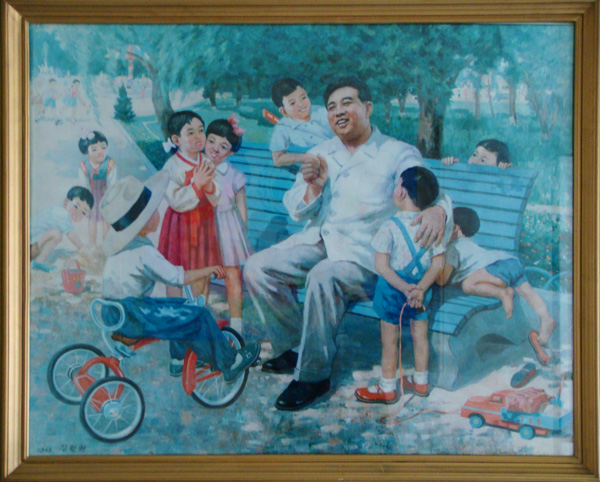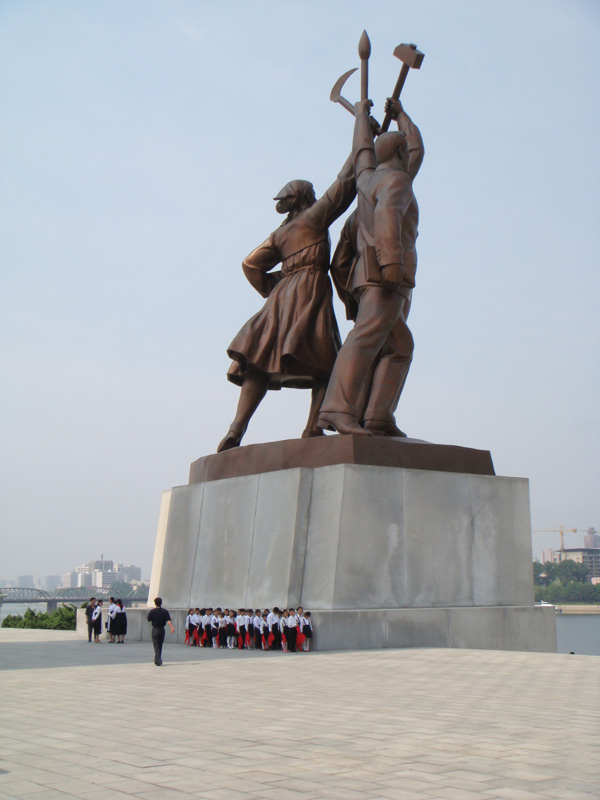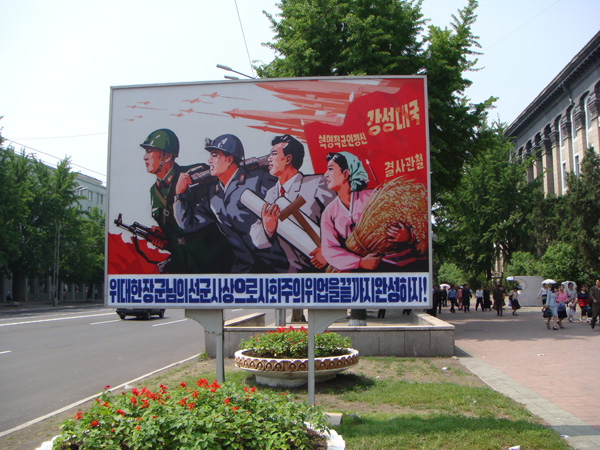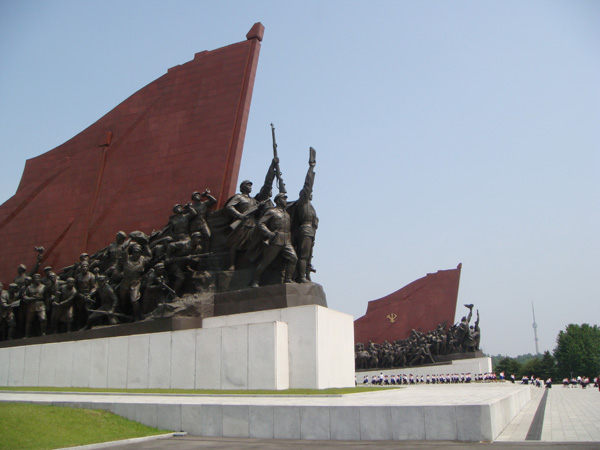Before going to North Korea (the Democratic People’s Republic of Korea or DPRK) I tried to prepare myself for what I knew would be the biggest culture shock imaginable because it is a country like no other. Would it be a mixture of the culture to be found in South Korea blended with the Soviet Union under Stalin and China under Mao? The simple answer, of course, is “none of the above”, and yet, every so often during a one-week visit, I would be reminded of all three of these comparators.
I had been invited to Pyongyang to teach the United Nations country team there how to become more effective negotiators. Half of my students were expats from a dozen different countries, working for UNICEF, WHO, FAO and a number of other agencies. The other half worked for the same UN agencies, but were North Korean nationals – an elite group who spoke English, were trusted by the regime and who had three jobs: their official UN job, taking on the role of “minder” for UN expats and visitors, and being the eyes and ears of the government within the UN offices.
The thinking of my UN hosts was that it would be good for representatives of the most difficult government with which the international community has to negotiate to be exposed to a negotiation philosophy that emphasizes the gains to be made by putting one’s self in the other person’s shoes and recognizing the interests of both sides in a negotiation. I wasn’t optimistic that we would make much progress!
Arriving at Pyongyang’s Sunan Airport, the first oddity was the customs declaration, which, inter alia, asked if I was carrying any “killing devices” or “exciters”. My laptop was inspected carefully, but my small camera attracted no attention. However, all mobile phones are confiscated and placed in a small pouch, with a receipt being issued for collection on departure. The execution in March 2010 of a North Korean man for using a smuggled mobile phone to call a defector friend in South Korea, is a measure of the sensitivity of communications in North Korea.
The airport has a fairly large and impressive terminal building, but the lack of activity there, with several decrepit Tupolev and Antonev Air Koryo jets sitting ready to provide the airline’s only two daily flights from Pyongyang (to Beijing and Vladivostok) hints of the moribund state of the economy. I was fortunate in that Air China had resumed service from Beijing a week before I travelled, so I was able to avoid the Air Koryo experience.
As my UN car had not shown up to meet me, I looked for a taxi rank, but was stopped from exiting the terminal unaccompanied, and fellow passengers told me that taxis simply didn’t exist. Fortunately, a New Zealand investment banker who lived in Pyongyang (yes, really! At least he will be in on the ground floor if and when investment opportunities open up) was able to call the UN offices where they had thought I was arriving the next day.
When my car finally arrived, I met my 30-something female “minder”, who worked for the UN and who escorted me everywhere and was a participant in the programme I taught. Each time she delivered me to the Hotel Koryo, she made a call from the front desk to tell her controllers where I was, and although she had two children at home, she had a room at my hotel throughout my stay.
Everywhere in Pyongyang there are massive statues and portraits of the founder of the DPRK, Kim Il-sung, and equally impressive murals of revolutionary figures or of him. Even the office of UNICEF has a large oil painting of a kindly Kim Il-sung, surrounded by children, one of whom is wearing his hat. Surprisingly, his son, the current leader, Kim Jong-il, is featured much less prominently, reflecting the concept of Kim Il-sung being the “eternal president, the supreme leader, and the sun of all people” according to the Juche philosophy that he established. It is Kim Il-sung, rather than Kim Jong-il, whose portrait is on the little enamel badges that everyone wears on their lapels.

The personality cult surrounding North Korea’s only two leaders is reminiscent of the adulation of Lenin (and to some extent, Stalin) in the Soviet Union, and Mao in China. But the family dynasty element is different. In some ways the idea of a family being in charge (leaving aside traditional hereditary monarchies) is similar to the chaebol in South Korea – conglomerates of companies owned, controlled and managed by the same family. Ironically, these family industrial empires, closely tied to the political elites of South Korea, have been engines of growth, in contrast to the economic decline of North Korea under its “family leadership”.
Any observations on North Korean culture have to be seen in the context of the omnipresent Juche ideology. Juche demands absolute loyalty to the Workers Party of Korea and to (currently) Kim Jong-il. It places the ordinary people as the masters of the country’s development, eschews any relationships with the great powers, and emphasises independent thought and self-reliance in both economic and defence terms.
The reality, of course, is that North Korea has never been self-sufficient. Until the collapse of the Soviet Union, it was reliant on aid from Moscow. It has lurched from economic crisis to economic crisis with masses of its people suffering starvation. China has provided tremendous quantities of aid for more than a decade and other countries are providing assistance under the six-party talks framework. North Korea is the second largest recipient of food aid in the world. All the English language literature in my hotel excoriated American “warmongers”, yet on the day that I arrived in Pyongyang, a team from the United States embarked on talks with the government to provide American food aid.
While it has replaced Marxism-Leninism in North Korea, Juche acknowledges the influence of traditional communist doctrine, although over the past two decades, the military rather than the proletariat or working class, is the main revolutionary force. To the traditional hammer and sickle, symbolizing the factory worker and the farmer, Juche’s icons also include a writing brush for the “Samuwon” class of writers, professors, engineers, and bureaucrats – a departure from the emphasis in other communist nations.

Revolutionary posters all follow the same formula: a farmer, a factory worker, an office worker or engineer, usually carrying a T-square, and a soldier. One is always a woman.

The Juche philosophy controls everyone’s activities and leaves no room for the thought that any ideas emanating from Western or Asian management concepts would have any value. It is uncompromising, and visitors to North Korea are left in no doubt that their hosts are setting the terms of any discussion.
This was a depressing thought as I set out to teach cooperative, interests-based negotiation to 11 North Koreans and 11 foreign UN officials at a hot-springs resort two hours away from Pyongyang.
The resort was reached via an empty eight-lane highway that extended for the first ten miles or so from the capital. I was told that this also served as a runway and a military access road. Communities through which we passed were clearly very poor, but the rice paddies appeared to be well maintained in this, comparatively visible, part of the country. The resort itself was surprisingly comfortable and the people running it were considerably friendlier than their counterparts at the hotel in Pyongyang.
Knowing that the North Korean nationals among my students were reporting back to the authorities, I felt a bit self-conscious as I started teaching. Rather like a Western politician whose offhand remarks come home to roost in the pages of the tabloid press, I envisioned myself being grilled by steely faced interrogators, seeking an explanation for the code word, BATNA (Best Alternative to a Negotiated Agreement, a key element of negotiation strategy) or for clarification of the punch line of a joke I had made. Indeed, the sessions got off to a tense start, with the two groups, whom I had deliberately mixed together in the seating arrangements, regarding each other with suspicion. Early on there was a worrisome moment when I realized that a simulation I had written and for which I was about to hand out roles, referred to something having taken place in Seoul, the very mention of which is taboo. I was quickly able to revise the scenario with the substitution of Bangkok.
To my surprise, I soon found that the North Korean nationals started to catch my eye and smile, asking questions, and enjoying playing roles of people very different from themselves. They cheerfully engaged in negotiations ranging from selling a line of pickles to a Canadian supermarket chain, to being the top civil servant in a finance ministry or his counterpart in the education ministry of a small country, haggling over the latter’s annual budget allocation. After a bit, everyone was laughing a lot, and the inflexibility and hardness that was evident from my minder and most of the others melted away.
There were, of course, constant reminders of where we were. The television offered a steady diet of Kim Jong-il “directing and inspiring” workers at a factory/mine/farm, interspersed with military parades and droning propaganda and martial music. A variation of the latter woke me up each morning both in Pyongyang and at the resort, as recorded music of massed choirs extolled the achievements of Kim Jong-il, the Workers Party of Korea and Juche.
At the end of the two-day workshop, all the North Koreans clamoured to be included in photographs taken with me. It had turned out very differently than I had expected and at the inter-agency meeting (comprising all the UN agencies and foreign ambassadors), which I attended before I left, the expat UN officials reported that this was the first time they had ever experienced such congeniality with their North Korean “colleagues”.
I had no illusions that my teaching had worked some alchemy, but I felt I had learned a bit from living at close quarters with these intelligent and, ultimately, friendly North Koreans. I detected an element of “face” which plays such a big part in Chinese, Japanese and South Korean (where it is called kibun) cultures. At first they didn’t want to make a fool of themselves in front of their expat colleagues or even amongst themselves, but they soon found that much of what I was teaching was making everyone realize the mistakes we all make in decision-making and negotiation, so everyone felt they were in the same boat.
Even though I was with them for a very short time, I also detected elements of guanxi, which underpins successful business relations in China. Guanxi is about mutual dependence in relationships, and reciprocity, key elements of a pragmatic approach to negotiation. In the role-plays we conducted, everyone realized that they depended on others and relationships are very important. This sense of having built a relationship came across very noticeably with my minder, who had been very cold and authoritarian when she met me at the airport the first evening, but who opened up and talked about her hopes and aspirations for her children in a very natural way towards the end of my visit, while remaining firmly focused on the infallibility of Kim Il-sung and professing her love of the very strange country in which she lived.
As someone who teaches cooperative, give and take, and comparative advantage negotiations, was I able to draw any lessons from the implacable hard-nosed approach that the North Korean government displays in international arena?
There was one very compelling lesson from the negotiations between the US food aid delegation and the North Koreans that were underway when I arrived. The Americans had come woefully ill-prepared and insisted on starting the negotiations right away while they were still under the influence of jetlag. They did not, for instance, know which provinces were closed to NGOs, which would be used to distribute the aid, surely an essential piece of homework. In contrast, the North Koreans knew everything about the issues in play and the constraints to which the American team was subject. They were also very happy to let the Americans keep negotiating until 2:00 AM when they were exhausted and no longer on top of their arguments. Thorough preparation and then easing slowly into the negotiations are wise approaches for anyone to embrace.
When I took off on my Air China Boeing 737 (symbolizing, perhaps, the pragmatic Chinese approach of engagement with the West), and flew back to Beijing, which, in contrast seemed such a bustling, open and tolerant place, I reflected on the sad lot of the North Korean people, starving, imprisoned, and cut off from most of the world. I felt depressed when I recalled that a couple of senior UN officials had told me that they had no idea who was in charge in North Korea – certainly not Kim Jong-il, they said. As I write, there is evidently a power struggle between the dynasty represented by Kim Jong-il’s youngest son, Kim Jong-un, and other forces in this secretive state.
Who knows how long it will take for things to change in North Korea and whether change can come about peaceably. In China, the excesses of the Great Leap Forward and the Cultural Revolution created an environment where big changes, brought about by Deng Xiaoping through, in part, opening up to the rest of the world, were the only way forward. Maybe the sheer desperation of a failed state will lead to change. Maybe the little green shoots of potential engagement like the Najin-Sonbong free trade zone, the six-party and the reunification talks, and the inclusion of North Korean nationals in my UN negotiation workshop, should give me hope that change is possible.

Post Tags: Tags: cross-culture, Kim Il-sung, Kim Jong-il, negotiating, negotiation, North Korea, Pyongyang, Tim Cullen

It’s is really an eye opener for those who are interested to know something about North Korea. This is very educative article and loaded with insightful information about Korean culture. Hope to see more similar articles in future. Thanks for this post.